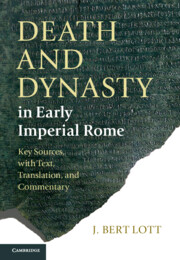3 - Commentary
Published online by Cambridge University Press: 05 November 2012
Summary
DPL
By the fifth century BCE Pisa was an Etruscan community on the banks of the Arno River in Northwestern Italy. In the third century BCE the Romans used the city and its port as a naval base against the Ligurians (Livy 21.39) and the Carthaginians but after the war the city lost territory to the new Roman colonies at Luca and Luna. Sometime before the late republic the city became a municipium, or citizen settlement, and before the death of Lucius Caesar, probably in the Triumviral period since it was called Julia rather than Augusta, the city was converted into a colony, becoming formally the Colonia Opsequens Iulia Pisana, probably with a settlement of legionary veterans called coloni Iulienses. Obsequens (propitious) was an epithet borrowed from Venus, patron goddess of the Julian clan. Pisa evidently continued to be quite successful in the early empire (a trove of ships lost in the ancient harbor, now silted-up, were discovered in 1999) although it is only rarely attested in literary sources. Archaeology has not revealed much of the plan or buildings of the ancient city. However, the remains of a theater, an amphitheater, a temple for Vesta, and necropoleis outside the city gates as well as the existence of a temple of Augustus (DPL 1) show that the colony was equipped with the regular urban amenities expected of a prosperous Italian city.
As in most Italian citizen communities in the early principate, the local government at Pisa consisted of a town council and a set of regular magistracies. The town council (senatus or curia) was made up of decuriones, normally one hundred leading citizens selected by co-option, service in a magistracy, or birth. The council oversaw public administration and finances and regulated and advised the magistrates, and maintained relations with Rome and the emperor. The town council, like the senate at Rome, enacted its will primarily through decrees (decreta decurionum), and the inscribed texts commemorating Gaius and Lucius are both display copies of such local decrees.
- Type
- Chapter
- Information
- Death and Dynasty in Early Imperial RomeKey Sources, with Text, Translation, and Commentary, pp. 174 - 317Publisher: Cambridge University PressPrint publication year: 2012



